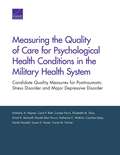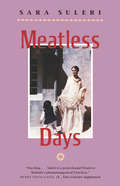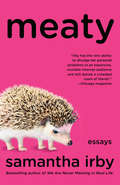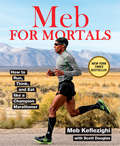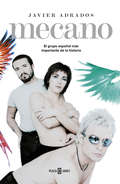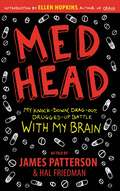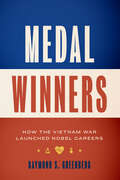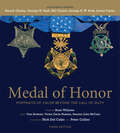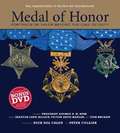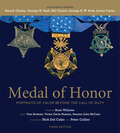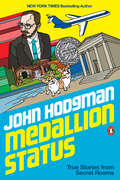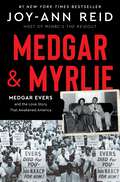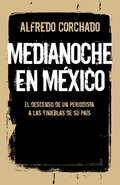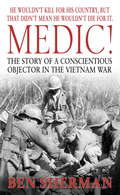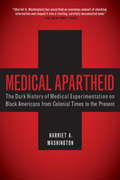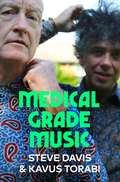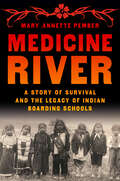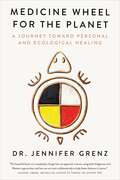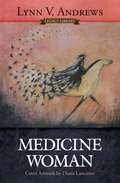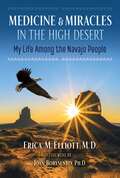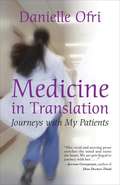- Table View
- List View
Measuring the Mosaic
by Rick Helmes-HayesMeasuring the Mosaic is a comprehensive intellectual biography of John Porter (1921-1979), author of The Vertical Mosaic (1965), preeminent Canadian sociologist of his time, and one of Canada's most celebrated scholars. In the first biography of this important figure, Rick Helmes-Hayes provides a detailed account of Porter's life and an in-depth assessment of his extensive writings on class, power, educational opportunity, social mobility, and democracy.While assessing Porter's place in the historical development of Canadian social science, Helmes-Hayes also examines the economic, social, political and scholarly circumstances - including the Depression, World War II, post-war reconstruction, the baby boom, and the growth of universities - that contoured Porter's political and academic views. Using extensive archival research, correspondence, and over fifty original interviews with family, colleagues, and friends, Measuring the Mosaic stresses Porter's remarkable contributions as a scholar, academic statesman, senior administrator at Carleton University, and engaged, practical public intellectual.
Measuring the Quality of Care for Psychological Health Conditions in the Military Health System: Candidate Quality Measures for Posttraumatic Stress Disorder and Major Depressive Disorder
by Elizabeth M. Sloss Susan D. Hosek Katherine E. Watkins Coreen Farris Harold Alan Pincus Carrie M. Farmer Caroline Epley Kimberly A. Hepner Carol P. Roth Grant R. Martsolf Daniel MandelTo inform improvements to the quality of care delivered by the military health system for posttraumatic stress disorder and major depressive disorder, researchers developed a framework and identified, developed, and described a candidate set of measures for monitoring, assessing, and improving the quality of care. This document describes their research approach and the measure sets that they identified.
Meatless Days
by Sara SuleriIn this finely wrought memoir of life in postcolonial Pakistan, Suleri intertwines the violent history of Pakistan's independence with her own most intimate memories--of her Welsh mother; of her Pakistani father, prominent political journalist Z. A. Suleri; of her tenacious grandmother Dadi and five siblings; and of her own passage to the West. "Nine autobiographical tales that move easily back and forth among Pakistan, Britain, and the United States. . . . She forays lightly into Pakistani history, and deeply into the history of her family and friends. . . . The Suleri women at home in Pakistan make this book sing. "--Daniel Wolfe,New York Times Book Review "A jewel of insight and beauty. . . . Suleri's voice has the same authority when she speaks about Pakistani politics as it does in her literary interludes. "--Rone Tempest, Los Angeles Times Book Review "The author has a gift for rendering her family with a few, deft strokes, turning them out as whole and complete as eggs. "--Anita Desai, Washington Post Book World "Meatless Daystakes the reader through a Third World that will surprise and confound him even as it records the author's similar perplexities while coming to terms with the West. Those voyages Suleri narrates in great strings of words and images so rich that they left this reader . . . hungering for more. "--Ron Grossman, Chicago Tribune "Dazzling. . . . Suleri is a postcolonial Proust to Rushdie's phantasmagorical Pynchon. "--Henry Louise Gates, Jr. ,Voice Literary Supplement
Meatless Days
by Sara SuleriIn this finely wrought memoir of life in postcolonial Pakistan, Suleri intertwines the violent history of Pakistan's independence with her own most intimate memories of her Welsh mother; of her Pakistani father, prominent political journalist Z. A. Suleri; of her tenacious grandmother Dadi and five siblings; and of her own passage to the West. "Nine autobiographical tales that move easily back and forth among Pakistan, Britain, and the United States. . . . She forays lightly into Pakistani history, and deeplyinto the history of her family and friends. . . . The Suleri women at home in Pakistan make this book sing. " Daniel Wolfe, "New York Times Book Review" "A jewel of insight and beauty. . . . Suleri's voice has the same authority when she speaks about Pakistani politics as it does in her literary interludes. " Rone Tempest, "Los Angeles Times Book Review" "The author has a gift for rendering her family with a few, deft strokes, turning them out as whole and complete as eggs. " Anita Desai, "Washington Post Book World" ""Meatless Days" takes the reader through a Third World that will surprise and confound him even as it records the author's similar perplexities while coming to terms with the West. Those voyages Suleri narrates in great strings of words and images so rich that they left this reader . . . hungering for more. " Ron Grossman, "Chicago Tribune" "Dazzling. . . . Suleri is a postcolonial Proust to Rushdie's phantasmagorical Pynchon. " Henry Louise Gates, Jr. , "Voice Literary Supplement""
Meatless Days (Flamingo Ser.)
by Sara Suleri GoodyearIn this finely wrought memoir of life in postcolonial Pakistan, Suleri intertwines the violent history of Pakistan's independence with her own most intimate memories—of her Welsh mother; of her Pakistani father, prominent political journalist Z.A. Suleri; of her tenacious grandmother Dadi and five siblings; and of her own passage to the West. "Nine autobiographical tales that move easily back and forth among Pakistan, Britain, and the United States. . . . She forays lightly into Pakistani history, and deeply into the history of her family and friends. . . . The Suleri women at home in Pakistan make this book sing."—Daniel Wolfe, New York Times Book Review "A jewel of insight and beauty. . . . Suleri's voice has the same authority when she speaks about Pakistani politics as it does in her literary interludes."—Rone Tempest, Los Angeles Times Book Review "The author has a gift for rendering her family with a few, deft strokes, turning them out as whole and complete as eggs."—Anita Desai, Washington Post Book World "Meatless Days takes the reader through a Third World that will surprise and confound him even as it records the author's similar perplexities while coming to terms with the West. Those voyages Suleri narrates in great strings of words and images so rich that they left this reader . . . hungering for more."—Ron Grossman, Chicago Tribune "Dazzling. . . . Suleri is a postcolonial Proust to Rushdie's phantasmagorical Pynchon."—Henry Louise Gates, Jr., Voice Literary Supplement
Meaty: Essays
by Samantha IrbyAs a writer and performer, Samantha Irby is a force of nature. As the genius behind the hilarious blog BITCHES GOTTA EAT, she's your sharp-tongued best friend who can't help but tell it like it is. In her debut essay collection MEATY, Samantha Irby explodes onto the page with essays about laughing her way through her ridiculous life of failed relationships, taco feasts, bouts with Crohn's Disease, and more. Written with the same scathing wit and poignant bluntness long-time readers have come to expect from her riotous blog, MEATY takes on subjects both highbrow and low-from why she can't be mad at Lena Dunham, to the anguish of growing up with a sick mother, to how to prepare your disgusting meat carcass for some new, hot sex, to why she wants to write your mom's Match.com profile.
Meb For Mortals: How to Run, Think, and Eat like a Champion Marathoner
by Scott Douglas Meb Keflezighi<p>Train like Olympic marathoner and 2014 Boston Marathon winner Meb KeflezighiWith his historic win at the 2014 Boston Marathon, Meb Keflezighi cemented his legacy as one of the great champions of long-distance running. <p>Runners everywhere wanted to know how someone two weeks away from his 39th birthday, who had only the 15th best time going into the race, could defeat the best field in Boston Marathon history and become the first American man to win the race in 31 years. <p>Meb For Mortals describes in unprecedented detail how three-time Olympian Keflezighi prepares to take on the best runners in the world. More importantly, the book shows everyday runners how to implement the training, nutritional, and mental principles that have guided him throughout his long career, which in addition to the 2014 Boston win includes an Olympic silver medal and the 2009 New York City Marathon title.
Mecano: El grupo español más importante de la historia
by Javier AdradosLa biografía definitiva y autorizada de Mecano. Hace cuarenta años que un adolescente llamado José María Cano le pidió a su hermano, Nacho, y a su novia, Ana, que le acompañaran en sus conciertos como cantautor por colegios mayores y bares de Madrid. En ese ambiente conocieron al productor musical Miguel Ángel Arenas, el "Capi", quien les recomendó que la voz principal fuera la de Ana y les consiguió un contrato con CBS. Así nació Mecano, sin imaginar que se convertiría en el fenómeno pop más importante de nuestra historia. Pero aún hay muchas preguntas sin responder sobre el grupo que ha vendido más de veinticinco millones de discos en todo el mundo. ¿Cómo se construyó Mecano? ¿Por qué provocaron esa feroz animadversión en los grupos de la movida madrileña? ¿Qué causó las tensiones entre los miembros de la banda que les llevaron a disolverse? Esta biografía es la respuesta a todos los interrogantes, un recorrido por la historia del grupo que aun a pesar de su desaparición, no ha dejado de sonar en ninguna de las emisoras de radio. La música de Mecano es presente
Med Head: My Knock-down, Drag-out, Drugged-up Battle with My Brain
by James Patterson Hal FriedmanCory Friedman woke up one morning when he was five years old with the uncontrollable urge to twitch his neck. From that day forward his life became a hell of irrepressible tics and involuntary utterances, and Cory embarked on an excruciating journey from specialist to specialist to discover the cause of his disease. Soon it became unclear what tics were symptoms of his disease and what were side effects of the countless combinations of drugs. The only certainty is that it kept getting worse. Simply put: Cory Friedman's life was a living hell. This is the true story of Cory and his family's decades-long battle for survival in the face of extraordinary difficulties and a maddening medical establishment. It is a heart-rending story of struggle and triumph with a climax as dramatic as any James Patterson thriller.
Medal Winners: How the Vietnam War Launched Nobel Careers
by Raymond S. GreenbergAs the ground war in Vietnam escalated in the late 1960s, the US government leveraged the so-called doctor draft to secure adequate numbers of medical personnel in the armed forces. Among newly minted physicians’ few alternatives to military service was the Clinical Associate Training Program at the National Institutes of Health. Though only a small percentage of applicants were accepted, the elite program launched an unprecedented number of remarkable scientific careers that would revolutionize medicine at the end of the twentieth century. Medal Winners recounts this overlooked chapter and unforeseen byproduct of the Vietnam War through the lives of four former NIH clinical associates who would go on to become Nobel laureates. Raymond S. Greenberg traces their stories from their pre-NIH years and apprenticeships through their subsequent Nobel Prize–winning work, which transformed treatment of heart disease, cancer, and other diseases. Greenberg shows how the Vietnam draft unintentionally ushered in a golden era of research by bringing talented young physicians under the tutelage of leading scientists and offers a lesson in what it may take to replicate such a towering center of scientific innovation as the NIH in the 1960s and 1970s.
Medal Winners: How the Vietnam War Launched Nobel Careers
by Raymond S. GreenbergAs the ground war in Vietnam escalated in the late 1960s, the US government leveraged the so-called doctor draft to secure adequate numbers of medical personnel in the armed forces. Among newly minted physicians’ few alternatives to military service was the Clinical Associate Training Program at the National Institutes of Health. Though only a small percentage of applicants were accepted, the elite program launched an unprecedented number of remarkable scientific careers that would revolutionize medicine at the end of the twentieth century. Medal Winners recounts this overlooked chapter and unforeseen byproduct of the Vietnam War through the lives of four former NIH clinical associates who would go on to become Nobel laureates. Raymond S. Greenberg traces their stories from their pre-NIH years and apprenticeships through their subsequent Nobel Prize–winning work, which transformed treatment of heart disease, cancer, and other diseases. Greenberg shows how the Vietnam draft unintentionally ushered in a golden era of research by bringing talented young physicians under the tutelage of leading scientists and offers a lesson in what it may take to replicate such a towering center of scientific innovation as the NIH in the 1960s and 1970s.
Medal of Honor: Enhanced Version
by Peter CollierOn October 25, 2010, Staff Sergeant Salvatore Giunta became the first living person since the Vietnam War to receive the United States’ highest military decoration, and both he and Sergeant Leroy Petry (the second inductee) rightly take their place in the pages of this third edition of Medal of Honor: Portraits of Valor Beyond the Call of Duty. The book includes 144 contemporary portraits of recipients by award-winning photographer Nick Del Calzo and profiles by National Book Award nominee Peter Collier. First published on Veterans Day 2003, this New York Times bestseller has now been updated and augmented to include new essays plus:• Letters from all living presidents • A foreword by Brian Williams • Profiles of Sergeant Giunta and Sergeant Petry There are also essays by Tom Brokaw, Senator John McCain, and Victor Davis Hanson, and a multimedia DVD with historic footage and recipients’ first-person reflections. The Medal of Honor recipients in the book fought in conflicts from World War II to Afghanistan, serving in every branch of the armed services.
Medal of Honor: Portraits of Valor Beyond the Call of Duty
by Peter CollierContemporary portraits of 144 recipients of the Medal of Honor by National Book Award nominee Peter Collier. The Medal of Honor recipients in the book fought in conflicts from World War II to Afghanistan, serving in every branch of the armed services. All were interviewed specifically for this book. First published on Veterans Day 2003, this New York Times bestseller has now been updated and augmented to include new essays plus: Letters from all living presidents; a foreword by Brian Williams; and profiles of Sergeant Giunta and Sergeant Petry, who were awarded the Medal of Honor after the publication of the first edition. There are also essays by Tom Brokaw, Senator John McCain, and Victor Davis Hanson. The Medal of Honor recipients in the book fought in conflicts from World War II to Afghanistan, serving in every branch of the armed services. All images described. Second edition.
Medal of Honor: Third Edition
by Peter Collier Nick Del CalzoOn October 25, 2010, Staff Sergeant Salvatore Giunta became the first living person since the Vietnam War to receive the United States’ highest military decoration, and both he and Sergeant Leroy Petry (the second inductee) rightly take their place in the pages of this third edition of Medal of Honor: Portraits of Valor Beyond the Call of Duty. The book includes 144 contemporary portraits of recipients by award-winning photographer Nick Del Calzo and profiles by National Book Award nominee Peter Collier. First published on Veterans Day 2003, this New York Times bestseller has now been updated and augmented to include new essays plus:• Letters from all living presidents • A foreword by Brian Williams • Profiles of Sergeant Giunta and Sergeant Petry There are also essays by Tom Brokaw, Senator John McCain, and Victor Davis Hanson, and a multimedia DVD with historic footage and recipients’ first-person reflections. The Medal of Honor recipients in the book fought in conflicts from World War II to Afghanistan, serving in every branch of the armed services.
Medallion Status: True Stories from Secret Rooms
by John Hodgman“[An] affecting and hilarious meditation on fame and prestige as seen through the lens of an airline loyalty program.” —The AV ClubA hilarious and honest new book in which John Hodgman, New York Times bestselling author of Vacationland, leaves vacation behind and gets back to work as a still somewhat famous person . . . and then loses his jobAfter spending most of his twenties pursuing a career as a literary agent, John Hodgman decided to try his own hand at writing. Following an appearance to promote one of his books on The Daily Show, he was invited to return as a contributor. This led to an unexpected and, frankly, implausible career in front of the camera that has lasted to this very day, or at least until 2016.In these pages, Hodgman explores the strangeness of his career, speaking plainly of fame, especially at the weird, marginal level he enjoyed it. Through these stories you will learn many things that only John Hodgman knows, such as how to prepare for a nude scene with an oboe, or what it feels like to go to a Hollywood party and realize that you are not nearly as famous as the Property Brothers, or, for that matter, those two famous corgis from Instagram. And there are stories about how, when your television gig is canceled, you can console yourself with the fact that all of that travel that made your young son so sad at least left you with a prize: platinum medallion status with your airline.Both unflinchingly funny and deeply heartfelt, Medallion Status is a thoughtful examination of status, fame, and identity--and about the way we all deal with those moments when we realize we aren't platinum status anymore and will have to get comfortable in that middle seat again.
Medgar and Myrlie: Medgar Evers and the Love Story That Awakened America
by Joy-Ann Reid#1 New York Times Bestseller“Medgar Evers deserves a place alongside Malcolm X and Dr. King in our historical memory. Evers, with Myrlie as his partner in activism and in life, was doing civil rights work in the single most hostile and dangerous environment in America.”—from Medgar and MyrlieBy MSNBC's Joy-Ann Reid, a triumphant work of biography that repositions slain Civil Rights pioneer Medgar Evers at the heart of America's struggle for freedom, and celebrates Myrlie Evers's extraordinary activism after her husband's assassination in the driveway of their Mississippi home."I love this book. The empathic, brilliant, and wise Joy Reid has brought us the poignant, fascinating inside story of Medgar and Myrlie Evers, transformational leaders who confronted pure evil and risked their lives to ensure that all American children might grow up in a United States that was more just. As Reid shows us, that painful task is now more urgent than ever.” — Michael BeschlossMyrlie Louise Beasley met Medgar Evers on her first day of college. They fell in love at first sight, married just one year later, and Myrlie left school to focus on their growing family.Medgar became the field secretary for the Mississippi branch of the NAACP, charged with beating back the most intractable and violent resistance to black voting rights in the country. Myrlie served as Medgar’s secretary and confidant, working hand in hand with him as they struggled against public accommodations and school segregation, lynching, violence, and sheer despair within their state’s “black belt.” They fought to desegregate the intractable University of Mississippi, organized picket lines and boycotts, despite repeated terroristic threats, including the 1962 firebombing of their home, where they lived with their three young children.On June 12, 1963, Medgar Evers became the highest profile victim of Klan-related assassination of a black civil rights leader at that time; gunned down in the couple’s driveway in Jackson. In the wake of his tragic death, Myrlie carried on their civil rights legacy; writing a book about Medgar’s fight, trying to win a congressional seat, and becoming a leader of the NAACP in her own right.In this groundbreaking and thrilling account of two heroes of the civil rights movement, Joy-Ann Reid uses Medgar and Myrlie’s relationship as a lens through which to explore the on-the-ground work that went into winning basic rights for Black Americans, and the repercussions that still resonate today.
Medianoche en México
by Alfredo CorchadoEs medianoche en México, 2007. El periodista, Alfredo Corchado recibe una llamada telefónica de su fuente principal para informarle que hay un plan para asesinarlo por parte de un poderoso capo. Pronto averigua que lo quieren matar porque uno de sus artículos en el Dallas Morning News afectó los sobornos que los narcotraficantes entregan a policías, militares y funcionarios del gobierno mexicano. Así comienza el viaje en espiral de un hombre que busca descifrar la compleja situación del país mientras lucha por salvar su vida. A pesar de recorrer un camino de múltiples encrucijadas, desigualdad y violencia extrema, Corchado, "infectado con la enfermedad incurable del periodismo", no se resigna a abandonar la esperanza en tiempos turbulentos. Ahora el líder del brutal cártel que lo perseguía, el Z-40 está detenido, pero la historia no ha terminado de escribirse.
Medic!: The Story of a Conscientious Objector in the Vietnam War
by Ben Sherman"On the firing range during the third week of Advanced Individual Training, I put down the handgun I had been assigned and stood back from the shooting podium. The sergeant barked something barely intelligible about six years in Leavenworth Federal Prison for refusing a direct order. I repeated that I wasn't going to train myself to kill anybody. Like falling dominoes, every soldier on the range stopped to turn and look at me. The sergeant called me a coward. I said again that I wasn't going to shoot the pistol. . . " In August 1968, Ben Sherman - then an eighteen year old college sophomore - was drafted, yet another Midwestern boy called to serve his country in the rice paddies of Vietnam. After his attempt for conscientious objector status was refused by the draftboard, Sherman distinguished himself almost immediately upon entering the military: he refused to fire a weapon. Instead, he told his superior officers that he was willing to serve in any capacity that would not require him to carry a gun. Within a few short weeks he found himself in swamps of Vietnam, working as a combat medic. From his start in the morgue, cleaning the bodies of fallen soldiers before they were sent home for burial, to operating on dying men while under front line fire, Sherman's story captures the sounds, smells, and terror of Vietnam as experienced by so many American soldiers who ended up in Vietnam without wanting to be there. Written with a rare combination of humor, honesty,and intelligence, Medic offers a glimpse into a world where unrelenting pressure and unbearable circumstances were common-place, where heroes fell on the battlefield daily, and where one man struggled to keep his conscience clear in the face of unspeakable horror.
Medical Apartheid: The Dark History of Medical Experimentation on Black Americans from Colonial Times to the Present
by Harriet A. WashingtonNATIONAL BOOK CRITICS CIRCLE AWARD WINNER • The first full history of Black America&’s shocking mistreatment as unwilling and unwitting experimental subjects at the hands of the medical establishment. No one concerned with issues of public health and racial justice can afford not to read this masterful book."[Washington] has unearthed a shocking amount of information and shaped it into a riveting, carefully documented book." —New York TimesFrom the era of slavery to the present day, starting with the earliest encounters between Black Americans and Western medical researchers and the racist pseudoscience that resulted, Medical Apartheid details the ways both slaves and freedmen were used in hospitals for experiments conducted without their knowledge—a tradition that continues today within some black populations.It reveals how Blacks have historically been prey to grave-robbing as well as unauthorized autopsies and dissections. Moving into the twentieth century, it shows how the pseudoscience of eugenics and social Darwinism was used to justify experimental exploitation and shoddy medical treatment of Blacks. Shocking new details about the government&’s notorious Tuskegee experiment are revealed, as are similar, less-well-known medical atrocities conducted by the government, the armed forces, prisons, and private institutions. The product of years of prodigious research into medical journals and experimental reports long undisturbed, Medical Apartheid reveals the hidden underbelly of scientific research and makes possible, for the first time, an understanding of the roots of the African American health deficit. At last, it provides the fullest possible context for comprehending the behavioral fallout that has caused Black Americans to view researchers—and indeed the whole medical establishment—with such deep distrust.
Medical Grade Music
by Steve Davis Kavus TorabiThe story of two outsiders and obsessives whose collision prompted an evangelistic alliance on the furthest frontiers of underground music.Steve Davis first met Kavus Torabi - guitarist with Gong, Guapo, Cardiacs and Knifeworld - in the mid-2000's at a gig by French underground rock legends Magma. Over the next few years, this unlikely duo's shared affinity for visionary psychedelic music would become the foundation of not only a firm friendship, but also the most infectiously inclusive broadcasting style since the much-mourned death of John Peel. In their weekly radio shows and a one-of-a-kind live DJ roadshow which included a legendary appearance at Glastonbury, Steve and Kavus mapped out a musical landscape of rare enchantment, where the only passport needed was a pair of open ears. No-one, least of all Davis and Torabi themselves, was expecting the 6-time former World Snooker champion and a British-Iranian underground rock musician to become one of the most trusted brands in British alternative music.As Steve and Kavus were starting to get to grips with the challenge of their newfound status, events took a further unexpected turn. Suddenly they found themselves in a band together. And not just any band ... as two thirds of Britain's (if not the world's) leading harmonium, guitar and analogue synth power-trio (with Michael J.York of Coil)The Utopia Strong, the two friends found themselves plunging into a vortex of spontaneous compositional excitement. How Steve and Kavus pulled this off is just one of the many questions MEDICAL GRADE MUSIC will try to answer. Part sonic memoir, part Socratic dialogue, part gonzo mission to the heart of what makes music truly psychedelic this book is the first work of joint autobiography to ever trace the evolution of a life-changing friendship through the discographies of Gentle Giant and Voivod. From the chip-shops of Plumstead to the the wildest shores of Plymouth's nineties thrash scene. it's a funny and fearless buddy movie of the soul, with a soundtrack that will make your eyes bleed.
Medicine River: A Story of Survival and the Legacy of Indian Boarding Schools
by Mary Annette PemberA sweeping and trenchant exploration of the history of Native American boarding schools in the United States, and the legacy of abuse wrought by them in an attempt to destroy Native culture and life.From the mid-nineteenth century to the late 1930s, tens of thousands of Native children were pulled from their tribal communities to attend boarding schools whose stated aim was to "save the Indian" by way of assimilation. In reality, these boarding schools—sponsored by the U.S. government, but often run by various religious orders with little to no regulation—were a calculated attempt to dismantle tribes by pulling apart Native families. Children were beaten for speaking their Native languages; denied food, clothing, and comfort; and forced to work menial jobs in terrible conditions, all while utterly deprived of love and affection.Amongst those thousands of children was Ojibwe journalist Mary Pember's mother, who was was sent to a boarding school in northern Wisconsin at age five. The trauma of her experience cast a pall over Pember's own childhood and her relationship with her mother. Highlighting both her mother's experience and the experiences of countless other students at such schools, their families, and their children, Medicine River paints a stark but hopeful portrait of communities still reckoning with the trauma of acculturation, religion, and abuse caused by the state. Through searing interviews and careful reporting, Pember traces the evolution and continued rebirth of Native cultures and nations in relation to the country that has been intent on eradicating them.
Medicine Wheel for the Planet: A Journey Toward Personal and Ecological Healing
by Jennifer GrenzA personal journey of bringing together Western science and Indigenous ecology to transform our understanding of the human role in healing our planetI used to be an ecologist. . . . Now, I am a community gatherer, working to help bring healing beyond just the land. I am a story-listener. I am a storyteller. I am a shaper of ecosystems. I work on bringing communities together, in circle, to listen to each other. A farm kid at heart, and a Nlaka&’pamux woman of mixed ancestry, Dr. Jennifer Grenz always felt a deep connection to the land. However, after nearly two decades of working as a restoration ecologist in the Pacific Northwest, she became frustrated that despite the best efforts of her colleagues and numerous volunteers, they weren&’t making the meaningful change needed for plant, animal, and human communities to adapt to a warming climate. Restoration ecology is grounded in an idea that we must return the natural world to an untouched, pristine state, placing humans in a godlike role—a notion at odds with Indigenous histories of purposeful, reciprocal interaction with the environment. This disconnect sent Dr. Grenz on a personal journey of joining her head (Western science) and her heart (Indigenous worldview) to find a truer path toward ecological healing. In Medicine Wheel for the Planet, building on sacred stories, field observations, and her own journey, Dr. Grenz invites readers to share in the teachings of the four directions of the medicine wheel: the North, which draws upon the knowledge and wisdom of elders; the East, where we let go of colonial narratives and see with fresh eyes; the South, where we apply new-old worldviews to envision a way forward; and the West, where a relational approach to land reconciliation is realized. Eloquent, inspiring, and disruptive, Medicine Wheel for the Planet circles around an argument that we need more than a singular worldview to protect the planet and make the significant changes we are running out of time for.
Medicine Woman (Medicine Woman Series)
by Lynn V. AndrewsThe first in the late Lynn Andrews&’s widely popular and visionary Medicine Woman series, this book will encourage you to find your own sacred feminine power.Join Lynn V. Andrews in her pivotal book Medicine Woman, following her journey as an American Indian art collector turned shaman initiate. While visiting an art gallery in Beverly Hills, Lynn sees an image of a rare American Indian basket, which immediately captivates her and haunts her dreams. Upon calling the gallery the following day, she finds that it has mysteriously disappeared. Through a series of serendipitous events, Lynn eventually finds herself in the wilderness of Manitoba to locate a Cree woman named Agnes Whistling Elk, who is said to know the location of the sacred marriage basket and could help Lynn retrieve it. But once up north, Lynn finds more than she bargained for. The evil shaman Red Dog has stolen the marriage basket from Agnes. Agnes asks fellow wise woman Ruby Plenty Chiefs to help her teach Lynn their sacred ways before she attempts to steal it back. From there, Lynn is instructed to become a huntress, invite her wolf-self forward to better serve her on her mission, and to learn to embrace her own sacred medicine. Will Lynn find the feminine power within herself in time to face and defeat Red Dog once and for all?
Medicine and Miracles in the High Desert: My Life among the Navajo People
by Erica M. Elliott• Details the author&’s time living with the Navajo people as a teacher, sheepherder, and doctor and her profound experiences with the people, animals, and spirits • Shows how she learned the Navajo language to bridge the cultural divide • Reveals the miracles she witnessed, including her own miracle when the elders prayed for healing of a tumor on her neck • Shares her fearsome encounters with a mountain lion and a shape-shifting &“skin walker&” and how she fulfilled a prophecy by returning as a doctor In 1971, Erica Elliott arrived on the Navajo reservation as a newly minted schoolteacher, knowing nothing about her students or their culture. After a discouraging first week, she almost leaves in despair, unable to communicate with the children or understand cultural cues. But once she starts learning the language, the people begin to trust her, welcoming her into their homes and their hearts. As she is drawn into the mystical world of Navajo life, she has a series of profound experiences with the people, animals, and spirits of Canyon de Chelly that change her life forever.In this compelling memoir, the author details her time living with the Navajo, the Diné people, and her experiences with their enchanting land, healing ceremonies, and rich traditions. She shares how her love for her students transformed her life as well as the lives of the children. She reveals the miracles she witnessed during this time, including her own miracle when the elders prayed for healing of a tumor on her neck. She survives fearsome encounters with a mountain lion and a shape-shifting &“skinwalker.&” She learns how to herd sheep, make fry bread, and weave traditional rugs, experiencing for herself the life of a traditional Navajo woman.Fulfilling a Navajo grandmother&’s prophecy, the author returns years later to serve the Navajo people as a medical doctor in an underfunded clinic, delivering numerous babies and treating sick people day and night. She also reveals how, when a medicine man offers to thank her with a ceremony, more miracles unfold. Sharing her life-changing deep dive into Navajo culture, Erica Elliott&’s inspiring story reveals the transformation possible from immersion in a spiritually rich culture as well as the power of reaching out to others with joy, respect, and an open heart.
Medicine in Translation: Journeys with My Patients
by Danielle OfriFor two decades, Dr. Danielle Ofri has cared for patients at Bellevue, the oldest public hospital in the country and a crossroads for the world's cultures. In Medicine in Translation, she introduces us, in vivid, moving portraits, to the patients she has known. They have braved language barriers, religious and racial divides, and the emotional and practical difficulties of exile in order to access quality health care. Sharing their journeys with them over the years, Danielle has witnessed some of their best and worst moments, and come to admire their resilience and courageous spirit. Danielle introduces us to her patients: Samuel Nwanko, who was brutally attacked by a Nigerian cult in his homeland and is attempting to create a new life in America; Jade Collier, an Aussie who refuses to let a small thing like a wheelchair keep her from being a homegrown ambassador to New York City; Julia Barquero, a Guatemalan woman who migrated to the States to save her disabled son but cannot obtain the lifesaving heart transplant she needs because she is undocumented. We meet a young Muslim woman threatened at knifepoint for wearing her veil, and the spitfire Señora Estrella, one of Danielle's many Spanish-speaking patients, whose torrent of words helps seal Danielle's resolve to improve her own Spanish, an essential skill in today's urban hospitals. And so she, her husband, and their two young children and seventy-five-pound dog relocate to Costa Rica, where they discover potholes the size of their New York City apartment, a casual absence of street signs or even street names, tangy green-skinned limon dulce dangling in the playground, and sudden rains surging over the craggy edges of roadside ditches. Ultimately, Danielle experiences being a patient in a foreign country when she gives birth to their third child, a "Costarricense" girl. With controversy over immigrants in our society escalating, and debate surrounding health-care reform becoming increasingly urgent, Ofri's riveting stories about her patients could not be more timely. Living and dying in the foreign country we call home, they have much to teach us about the American way, in sickness and in health.

